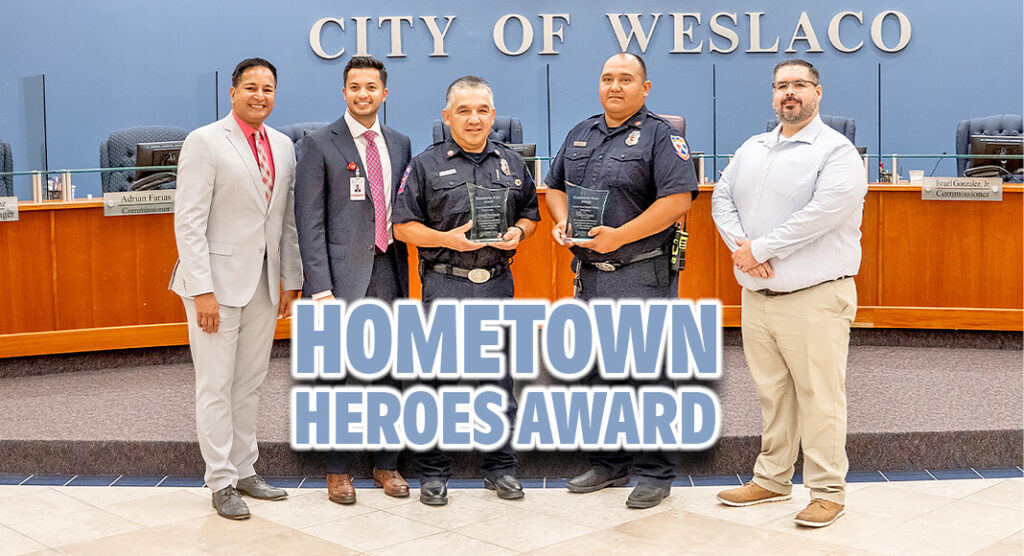
Mega Doctor News
Every 40 seconds, someone in the United States suffers a heart attack, according to the Centers for Disease Control and Prevention. Each year, however, about 280,000 Americans have an ST-elevation myocardial infarction (STEMI), a type of heart attack that is more serious and has a greater risk of serious complications and death. A STEMI heart attack, which mainly affects the lower chambers of the heart, has symptoms that aren’t as easily recognizable as the public may think, making them the deadliest type of heart attack.
Earlier this year, after experiencing chest pain for several days, an 81-year-old Weslaco resident decided to call 9-1-1, completely unaware he was experiencing a STEMI heart attack. But the two Weslaco Fire/EMS employees who arrived on the scene – EMT-paramedic Octavio Quiroz and EMT-intermediate Orlando Rodriguez – quickly recognized the severity of the situation.
Instead of transporting the elderly patient to a facility within the Weslaco city limits, Quiroz and Rodriguez opted to transport the elderly man to South Texas Health System Heart, an accredited Chest Pain Center with Primary PCI (percutaneous coronary intervention) facility. That fateful decision not only allowed the ER physicians and cardiologists at STHS Heart to treat the patient’s STEMI heart attack, but it also helped them discover that the patient had severe aortic valve stenosis, a condition involving the narrowing of the aortic valve opening, which would require additional surgery.
Nearly a week after his STEMI heart attack, cardiologists recommended the patient undergo a transcatheter aortic valve replacement (TAVR), a minimally invasive procedure that replaces an aortic valve that isn’t working properly.
“The patient’s TAVR procedure was a huge success,” said Carol Mejia, RN, BSN, the Director of Advanced Cardiac Care, STHS Heart. “He recently returned for a routine follow-up appointment with his cardiologist, who reported that he was doing amazingly well. He’s made a great turnaround. This was truly one of those unique cases where everything just seemed to align perfectly!”
To recognize Quiroz and Rodriguez’s swift, lifesaving and life-changing action, South Texas Health System held a surprise ceremony at the Weslaco City Hall to honor them as the system’s latest Hometown Heroes award recipients. The award is presented to exceptional first responders for their outstanding service in the call of duty.
“I don’t consider myself a hero, I’m just doing my job. But I’m honored to be recognized by South Texas Health System for the work I do,” Rodriguez said. “It’s very rewarding when former patients recognize me out in the community and tell me ‘Hey, you took me to the hospital, look how I’m doing now. Those interactions tell me we did the right thing; we were able to take care of this patient.”
“Many times, we don’t know what happens to our patients, so it feels great to hear that this patient in particular is doing well at home, to know he has an improved quality of life to continue through his golden years,” Quiroz said. “The best part is knowing that he’s still here with his family and that his grandkids will still have a few more years with him.”
Knowing that the patient in this case had luck on his side, Quiroz urges the public to seek medical attention if something just doesn’t feel right with their bodies.
“Don’t wait days or even a few hours,” Quiroz said. “If this patient had not been with family who urged him to call 9-1-1, I would hate to think what the outcome would have been.”
Much like this elderly Weslaco patient, who didn’t immediately recognize he was having a heart attack, there are many people who lack knowledge of what signs and symptoms to look out for in the event of a heart event, according to Jason Waller, Chest Pain & Trauma Coordinator at STHS Heart.
“Unfortunately, there’s a big education deficit among the public on what the actual symptoms of an acute coronary process, or a heart attack are,” Waller said. “A lot of people understand the textbook symptoms, such as crushing chest pain, shortness of breath, chest heaviness, chest tightness, etc., but many times symptoms can be vaguer. The severity can vary from person to person.”
Waller encourages the public to heed Quiroz’s advice to call 9-1-1 when they suspect something may be amiss with their health.
“These EMS providers train constantly, and they are eager to serve the community,” Waller said. “Reach out to them, call 9-1-1, because even if you don’t get transported to a hospital, they can still assess you and give you their recommendation based on what they believe may be ailing you.”
If you’d like to nominate an exceptional first responder in our community for the STHS Hometown Heroes Award, you can fill out a nomination form at SouthTexasHealthSystem.com.
To learn more about STHS Heart’s Transcatheter Aortic Valve Replacement program, or its other cardiac services, visit STHSHeart.com.










